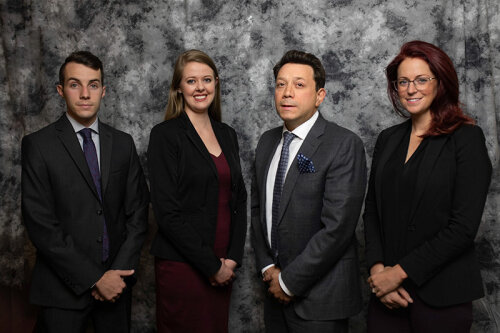Best Class Action Lawyers in Calgary
Share your needs with us, get contacted by law firms.
Free. Takes 2 min.
List of the best lawyers in Calgary, Canada
Canada Class Action Legal Articles
Browse our 2 legal articles about Class Action in Canada written by expert lawyers.
- Class Action Rights for Consumer Privacy Breaches in Canada
- Most consumer privacy class actions in Canada operate on an opt-out basis, meaning you are automatically included if you meet the class definition. You do not need to pay out-of-pocket legal fees to participate; lawyers are typically paid a percentage of the final settlement or court award. Certification is the... Read more →
- How to Join or Opt-Out of Canada Privacy Breach Class Actions
- Most Canadian provinces operate on an "opt-out" basis, meaning you are automatically included in a class action if you meet the criteria and live in the province where the case was filed. You do not pay any upfront legal fees to participate; lawyers are paid a percentage of the settlement... Read more →
About Class Action Law in Calgary, Canada
Class Action Law in Calgary forms a crucial component of Canada's legal system, providing an avenue for a group of people, who have been affected similarly by the actions of a particular entity, to make a collective claim. This kind of lawsuit is usually pursued when the number of individuals affected is so vast that it would impractical for each to file separate suits. Class action can touch various sectors including business disputes, product liability, human rights, environmental issues, and many more.
Why You May Need a Lawyer
In a class action, legal representation is particularly pivotal due to the complex nature of these lawsuits. Whether you're an individual member within the class of claimant or a representative plaintiff, you may need a lawyer to help you understand your rights, and navigate through the process. A lawyer can also provide essential guidance when it comes to negotiation, settlement, or going to trial, ensuring that your interests are effectively represented.
Local Laws Overview
The legal framework for class actions in Calgary is governed by the Alberta Rules of Court. These rules stipulate the necessary procedures for initiating a class action, responsibilities of the representative plaintiff, and how issues like notice to class members, opt-out opportunities, and settlements are handled. Crucially, the law expects the representative plaintiff to adequately and fairly represent the interests of the entire class, and the suit must be the 'preferable procedure' for resolving the claims.
Frequently Asked Questions
1. How does a class action lawsuit get started in Calgary?
A class action lawsuit begins when a Statement of Claim that meets the requirements of the Alberta Rules of Court is filed. It's then certified by the Court as a class proceeding if it meets set criteria.
2. How long does a class action lawsuit take?
The duration of a class action lawsuit heavily relies on the specific circumstances of the case. It could take a couple of years or even longer especially if the case is complex and involves numerous parties.
3. Can I join an existing class action lawsuit?
Yes. Once a lawsuit has been certified as a class action, notice is given to potential class members who may then choose to join or participate in the class action.
4. What happens if the class action lawsuit is successful?
If the class action is successful, all class members who have not opted out share in the settlement or judgement amount.
5. What is the role of a class action lawyer?
A class action lawyer represents the interests of the class. They provide advice, present arguments before the court, negotiate settlements and ensure fair distribution of the settlement among all claimants.
Additional Resources
The Law Society of Alberta and Alberta Courts website are excellent resources to understand the legal landscape of class actions in Calgary. They provide comprehensive information about laws, regulations, and related cases about class actions in Alberta.
Next Steps
If you need legal assistance in a class action, start by seeking a legal consultation with a lawyer who specializes in class actions in Calgary. They can provide you with personalized advice based on the specifics of your case, and guide you through further steps based on your needs and situation.
Lawzana helps you find the best lawyers and law firms in Calgary through a curated and pre-screened list of qualified legal professionals. Our platform offers rankings and detailed profiles of attorneys and law firms, allowing you to compare based on practice areas, including Class Action, experience, and client feedback.
Each profile includes a description of the firm's areas of practice, client reviews, team members and partners, year of establishment, spoken languages, office locations, contact information, social media presence, and any published articles or resources. Most firms on our platform speak English and are experienced in both local and international legal matters.
Get a quote from top-rated law firms in Calgary, Canada — quickly, securely, and without unnecessary hassle.
Disclaimer:
The information provided on this page is for general informational purposes only and does not constitute legal advice. While we strive to ensure the accuracy and relevance of the content, legal information may change over time, and interpretations of the law can vary. You should always consult with a qualified legal professional for advice specific to your situation.
We disclaim all liability for actions taken or not taken based on the content of this page. If you believe any information is incorrect or outdated, please contact us, and we will review and update it where appropriate.













